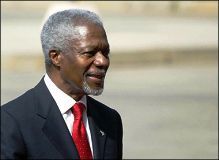Annan reform proposal would create a Human Rights Council
By EDITH M. LEDERER, Associated Press Writer
UNITED NATIONS, Mar 21, 2005 (AP) — One of the most far-reaching U.N. reforms proposed by Secretary-General Kofi Annan would create a new Human Rights Council at the top rung of the world body to replace the much criticized Human Rights Commission.
 The 53-member commission, which is currently meeting in Geneva, has been attacked by Western governments and human rights campaigners for allowing the worst-offending countries to use their membership to protect one another from condemnation or to criticize others.
The 53-member commission, which is currently meeting in Geneva, has been attacked by Western governments and human rights campaigners for allowing the worst-offending countries to use their membership to protect one another from condemnation or to criticize others.
In his sweeping report Sunday to the 191 U.N. member states on U.N. reform, Annan joined the criticism saying this practice has undermined the commission’s work and created “a credibility deficit … which casts a shadow on the reputation of the United Nations system as a whole.”
“If the United Nations is to meet the expectations of men and women everywhere — and indeed, if the organization is to take the cause of human rights as seriously as those of security and development — then member states should agree to replace the Commission on Human Rights with a smaller standing Human Rights Council,” Annan said.
Under U.N. rules, members of the Human Rights Commission have been picked by regional groups. Current member states that have been criticized for abuses include Sudan, China, Cuba, Nepal, Russia and Zimbabwe. A number of countries with poor human rights records have been on the commission over the years. Libya has even held the chair.
Annan proposed that members of the Human Rights Council be elected directly by the General Assembly, by a two-thirds majority, and that “those elected to the council should undertake to abide by the highest human rights standards.”
“The creation of the council would accord human rights a more authoritative position, corresponding to the primacy of human rights in the Charter of the United Nations,” Annan said.
The secretary-general said member states should decide whether the council should be a principal organ of the United Nations, like the Security Council and the General Assembly, or a subsidiary body of the General Assembly.
Mark Malloch Brown, who is Annan’s chief of staff, explained that making the Human Rights Council a new U.N. organ requires a change in the U.N. Charter while making it a subsidiary body of the General Assembly does not.
“The whole idea is that this council will be on a par” with the other U.N. organs, Malloch Brown said. “Clearly charter change, which would put them unambiguously on an equal footing, would be the best, but realistically one may have to go through a slightly less direct, more technical solution.”
The report also called for U.N. High Commissioner for Human Rights Louise Arbour to play a more active role and urged countries to match their commitment to human rights with resources to strengthen her office.
“Human rights must be incorporated into decision-making and discussion throughout the work of the organization,” it said.
Joanna Weschler, U.N. representative for Human Rights Watch, welcomed Annan’s “bold solutions” and his inclusion of human rights throughout the report.
As for the proposed Human Rights Council, she said, “We think it’s an extremely good and courageous idea on the part of the secretary-general.”
At last week’s opening of the Human Rights Commission’s six-week session in Geneva, Arbour said the agency was undertaking reform and should concentrate on preventing abuses rather than debating whether countries need help to improve their record or should be shamed into behaving better.
The reforms she mentioned didn’t include getting rid of the commission, but Malloch Brown said such a step was needed.
“I think everybody’s recognized … that it’s time for reform or the risk of losing public support for that commission,” Malloch Brown said. “We believe the environment there is quite open to change.”
How is the United Nations going to get all the dictatorships and human rights abusers in the world to support a new Human Rights Council?
“Well many of them have always argued that they actually believe in a strong, open human rights system,” Malloch Brown said. “Let’s challenge that.”
The Human Rights Council is likely to get strong U.S. support.
Paula Dobriansky, U.S. undersecretary of state for global affairs, told the commission Thursday that without major reform, “we are allowing this body to be tarnished and turning our backs on those still fighting for the freedoms we possess.”
